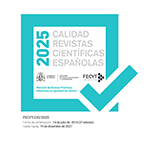Beyond the ‘Glasgow Discourse’? Emotions and Affects in Ellie Harrison’s The Glasgow Effect and Darren McGarvey’s Poverty Safari.
Abstract
The present article investigates two recently published essayistic memoirs, Ellie Harrison’s The Glasgow Effect (2019) and Darren McGarvey’s Poverty Safari (2017), and the debate between the two writers/artists within the wider framework of the Glasgow discourse, a manneristic imagination of the city shaped by the Glasgow novel in the course of the twentieth century. Focusing on issues of representation of traumatic historical memory, it relies especially on Myriam Jimeno’s idea of emotional community and presents the Glasgow novel as an example of such community, originally designed to make the predicament of the working classes visible. The article contends that many contemporary novels posit deviance from the genre’s original function of voicing the subaltern, exploiting instead a popular literary cliché. It also argues that both the texts, by representing their authors’ emotions and life stories as embedded in the city’s social and cultural landscape, dis/place the borders of the city’s imagination, simultaneously stumbling upon and pushing back the limits of the Glasgow discourse
Downloads
Article download
License
In order to support the global exchange of knowledge, the journal Complutense Journal of English Studies is allowing unrestricted access to its content as from its publication in this electronic edition, and as such it is an open-access journal. The originals published in this journal are the property of the Complutense University of Madrid and any reproduction thereof in full or in part must cite the source. All content is distributed under a Creative Commons Attribution 4.0 use and distribution licence (CC BY 4.0). This circumstance must be expressly stated in these terms where necessary. You can view the summary and the complete legal text of the licence.









